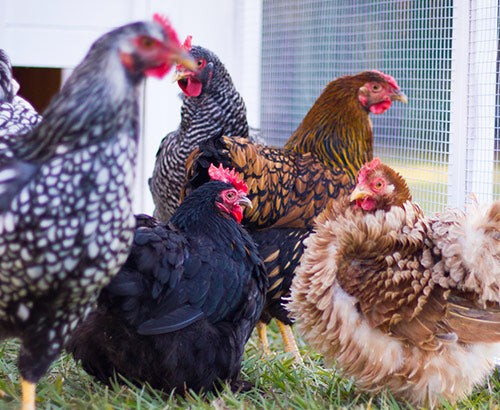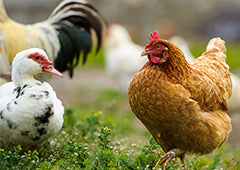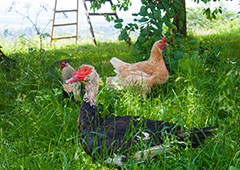Chickens
-
Temperament
- Every chicken is different and every breed has their strengths, but overall chickens are usually curious, affectionate and funny feathered characters to keep in your backyard.
-
Nutrition
- Full grown chickens need a constant supply of chicken feed, shell grit and water. However scraps like leafy greens, yoghurt and porridge will also be a perfect additional treat in their diet. Additionally, chickens need a constant supply of fresh water, as they drink between 500 ml to 1 L of water per day – depending on the weather conditions.
-
Housing
- A good setup for your chooks will ensure your girls are safe from the weather during extreme conditions, as well from predators, like foxes. The best security for your chickens is a quality coop, with a strong frame, fortified with galvanised wire mesh, like all the coops in our range.
-
Breeds
- There are certain chicken breeds that are renowned for being amazing family pets, that love to cuddle and show affection like any other friendly animal. For a rundown of our top 25 breeds for your backyard have a peck here.
-
Eggs
- Everyone knows about the spectacular backyard chook egg! Egg production varies by breed, but whatever chickens you’re raising, expect delicious breakfasts in your future.

Ducks
-
Temperament
- Just like chickens, ducks range in temperament from placid to active depending on the breed you choose. Overall, ducks are usually active foragers and placid breeds that like to be handled make great pets for kids and grown ups alike.
-
Nutrition
- Ducks’ nutritional needs are similar to that of chickens, but they have a higher metabolic rate, which means they need to consume more feed. For laying females they need protein and calcium - similar to that you’ll find in a chicken’s diet. They also make great pest control agents as they love to hunt down tadpoles, insects and snails.
-
Housing
- Ducks need space to forage and water to paddle in. For smaller breeds a backyard paddling pool is sufficient. For larger breeds or a bigger flock you will need a pond. Unlike chickens, backyard ducks don’t roost - preferring to sleep close to the ground. A safe and cozy run with spots for sleeping and an earth floor is best as they will drip too much moisture onto timber floors.
-
Breeds
- If you want a placid duck that will love to be handled by the kids we suggest Pekins, Appleyards or Saxony breeds. Any duck will make a good pet though if handled and interacted with from a young age - so make friends with your quacker!
-
Eggs
- Ducks will lay many, or few eggs depending on the breed. For example, Anconas are a match for chooks, laying up to 240 eggs per year. Duck eggs are nearly twice as large as the average chook egg, and are more rich in fat and flavour.

Geese
-
Temperament
- A pet goose or two is not for the faint of heart, they are active and full of personality! Most geese breeds make great guardians, alerting you if an unknown person or animal approaches your property. Geese aren’t always the snuggliest of backyard poultry - but they provide so much entertainment as they waddle about their business in your patch.
-
Nutrition
- Geese are notorious grazers and need a good sized yard with plenty of natural cropped grass to munch on in addition to a supply of wheat and feed pellets. They will also eat soft leaved vegetables and plants so keep these girls and ganders from nibbling at your gardens with some poultry fencing. Just like ducks and chickens, geese will need grit for gut health and calcium intake too so keep a dish of it accessible for them.
-
Housing
- Like ducks, geese need space to forage and water to paddle in (due to their size they will need considerably more than chickens or ducks). They will need a water supply like a large paddling pool or pond as all geese like a dip! Just like ducks, backyard geese don’t roost - preferring to sleep close to the ground. A safe and cozy run with spots for sleeping and an earth floor is best as they will drip too much moisture onto timber floors.
-
Breeds
- The most popular breeds of backyard honkers are Embden, Chinese and Toulouse geese. Embden geese are active and have the classic white feathers and golden orange beak and feet you’d expect to see in a goose. Chinese geese are full of personality and have a unique look thanks to the bulbous knob atop their bill. Toulouse geese are slow and stately looking geese that add a French flair to any mixed flock.
-
Eggs
- Geese only lay about 30 eggs per year, but what they lack in quantity they make up for in quality. A goose egg is nearly 3 times the size of an average chook egg, and relatively richer in protein and healthy fats.

Guinea fowl
-
Temperament
- Guineas have a short fuse and will be quick to put other poultry in their place with a feisty peck. There’s a reason we talk about a ‘fowl’ temper! However, their cantankerous nature can be a boon for the backyard keeper: they are protective of their flock, and their angry screeching is known to keep predators at bay. These birds will generally be better socialised if raised with the rest of your poultry, so get your Guinea Alarm System today, and invest in the future!
-
Nutrition
- Your guinea fowl like nothing more than a six-legged snack, and their appetite for insects helps keep the food bill down. That said, we recommend providing turkey feed so they can gobble up enough protein and essential nutrients. Unlike most other poultry, Guinea fowl don’t need grit, as the additional calcium makes their tiny eggs overly brittle.
-
Housing
- Though they don’t seem like ideal housemates, guinea fowl do need to sleep in the hutch. You might need to convince them, though! These strong-headed birds love to roam, and they’ll need to stay cooped up until they get the idea.
-
Breeds
- Many different species of guinea fowl live in the wild, but far and away the most common domesticated species is the helmeted guinea fowl. Unless you’re a real poultry pro, they’ll be the choice for your backyard too.
-
Eggs
- A guinea fowl hen will lay up to 100 small (but yolk-rich) eggs per year. You might need to hunt around the backyard on hands and knees to find them, as guinea fowl aren’t known for good nesting box etiquette.
Quail
-
Temperament
- In keeping with their itty-bitty size, quail tend to be more cautious than the other poultry we’ve talked about. They’re quick to fly—and good at it too—so remember that if you’re letting them out of the coop. Once they feel comfortable with their surroundings, your cute little quail will turn curious, and wonderfully chirpy.
-
Nutrition
- Compared to chickens, quail need a little extra protein to keep their tiny little bodies chugging along. If you can’t find specially formulated quail feed, turkey starter or grower is perfect. Be sparing with treats, and provide a little grit with their food to help with digestion. And don’t worry about your quail overeating—they know their own limits!
-
Housing
- Because they are so small, quail don’t need a huge amount of space: 30cm by 30cm of floorspace is plenty. However, what they do need, is serious protection from predators. Unlike chickens, quail are easy prey for cats, and even wild birds like crows. For this reason, we do not suggest free-ranging your quail. Instead, provide a secure enclosure, with narrow aperture mesh to prevent them escaping—something like our Cluck House is perfect. We also don’t recommend mixing them with your chickens, as pecking order disputes rarely end well for pint-sized poultry. Other than that, treat your quail like tiny chickens, with a (shallow) pint-sized waterer, dust bath, and all.
-
Breeds
- The most popular variety of quail are Japanese quail. Another popular breed, bobwhite quail, comes with the added bonus of being easy to sex, as the males have white heads, and the females ginger. Finally, the beloved button quail is exactly as adorable as it sounds. Whatever you decide on, don’t mix quail, as the larger breeds will pick on those smaller than them.
-
Eggs
- Japanese and bobwhite quail are excellent layers, laying as many as 250 small, yet delicious eggs per year. For reference, four quail eggs are roughly equal to one chicken egg.

Pheasants
-
Temperament
- Pheasants are usually kept for their gorgeous plumage, but just because these beautiful birds look good, doesn’t mean they like being ogled at! Pheasants are known for being secretive and nervous. Unlike chickens, they rarely enjoy human company, and will quickly duck out of sight if you get too close.
-
Nutrition
- As with quail, turkey feed is the next-best thing if you can’t find specifically-formulated pheasant food. All that wonderful plumage takes a fair share of protein! A little grit is also essential to digestion and egg production.
-
Housing
- When housing pheasants, look for all the same things you would with a chook coop: great ventilation, and predator protection. Pheasants need at least 0.5 square metre of run space each. However, they won’t enjoy a bare run: a brush pile, or other hiding spot is essential to satisfy these enigmatic birds.
-
Breeds
- Pheasants come in numerous different breeds, all displaying their own unique plumage, examples include: ring-necked, white-eared and golden. Silver pheasants are said to be more placid than other varieties, and so might be a better option for the backyard keeper.
-
Eggs
- Pheasants are not great layers, laying only about 40 small eggs per year.'
Whether you decide to have a mixed flock or stick with chicks, we all want to do an eggcellent job when caring for our feathered friends. There are plenty of things to consider when becoming a chicken parent from health to nutrition. Many chicken keepers struggle to handle chicken health or behaviour issues, especially in the first few years of having a flock.
This is why I recommend Chickenpedia to all my readers. They have comprehensive online courses on everything you didn’t know you need to know and then some more! From healthcare to raising baby chicks to feeding and behavior, you’ll find beginner-friendly courses that’ll give you the knowledge and confidence to successfully look after your chickens.
As a member, you will get access to ALL their fantastic courses. No need to wing it, become the ultimate chicken eggspert! Check out Chickenpedia today!



















